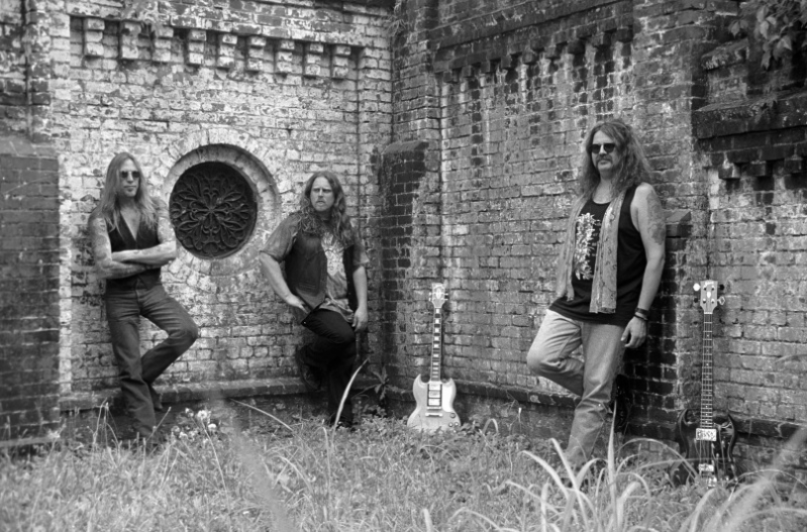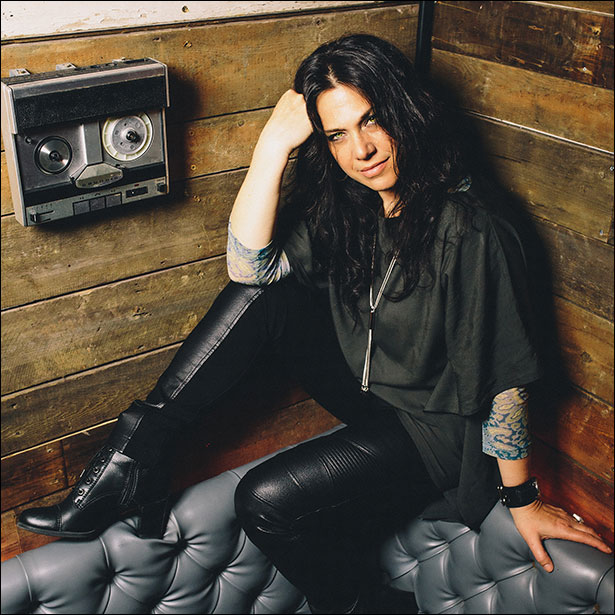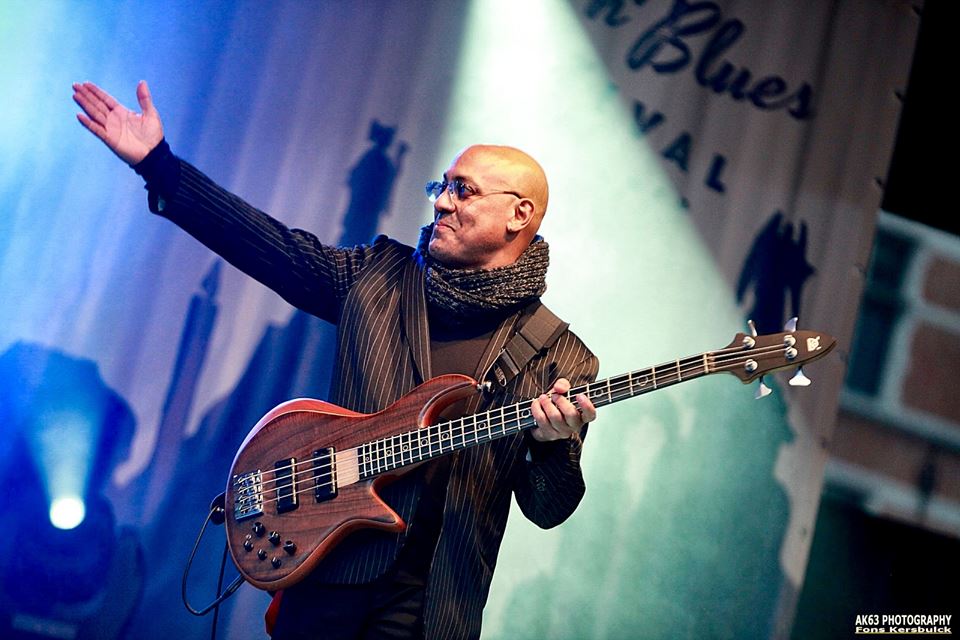Interviews

- Details
- Written by: Giovanni "Gio" Pilato
When Warren Haynes, Woody Allen and Matt Abts decided to convene in June 1994 at Tel-Star Studios in Bradenton, Florida, to work on what it supposed to be the debut album of a side project that would have allowed themselves to bring their alt-rock influences to a new level, they were far from imagining that such sessions would have generated one of the most successful music machines in the world, the Gov't Mule.
Those sessions though, never saw the light of the day until now in 2016, when Warren Haynes, frontman and band leader of Gov't Mule, finally decided to give justice to what can be considered the musical genesis of the band by releasing this material that captures perfectly the essence of three highly talented musicans and the excitement of the early days of The Mule.
Read more: Welcome To The Machine - In Conversation With Warren Haynes (Gov't Mule)

- Details
- Written by: Giovanni "Gio" Pilato
Every music fan knows exactly what to expect at an Andy Frasco And The U.N. concert. A music party made of two hours of pure entertainment, fun, excitement and, most importantly, great music played by highly skilled musicians. But the party doesn't exactly finish when the live show ends, because Andy & Co. would spend every single night some quality time with their fans, chatting to them and having few drinks together in an afterparty that would last until the wee hours of the morning.
Fresh from releasing a brand new album called Happy Bastards, a record that sees Frasco and The U.N. approaching a more mature and compact sound in comparison to their previous records, the band leader is living one of the most prolific moments of his career, both as a songwriter and as a musician. When we finally manage to talk to Frasco, one can immediately detect the reasons why the artist from Los Angeles is so much loved and respected by fans and fellow musicians. His presence, his friendly attitude and great personality would be able to spark the brightest light anywhere in the world and in every occasion.
(Photo by Jeremy Scott Photography)
BBR - Hi Andy, thank you for taking the time to talk to us at Bluebird Reviews. Happy Bastards, your new album, is a record that reflects the joy of life in many different ways. How long did it take for you and the U.N. to write the songs and record the album?
AF - As you may know, we do something like 250 shows a year in many countries, including the States, of course. Due to this busy schedule, we wrote this album while we were on the road, during few days off we had or through any window of opportunity we had. I would say that it took about a year to record something like 40 tracks, which we then knocked out to 12. I tried then to write almost a song per day and I think it took almost three weeks to get the best songwriting I could put down for the album. Hopefully we managed to do what we do best, which is to try and bring some happiness to the world through our music.
BBR - Do you generally plan very much in advance the making of a new album, in order to allow you to take the time you need to write the music and the lyrics or are you one of those artists that likes to work under pressure and get the album done almost on Deadline Day?
AF - Fundamentally, I like to get it done, no matter what. Every time I am in a studio, I just like to crack on and power through because if you overthink anything, that won't get the best out of you, as an artist. I rather like the immediacy of the moment and to follow my instinct. I try to give to a song a couple of stabs and if the tune is still not there, then I move on and maybe come back to it on a later stage. I am just a kind of guy that doesn't like to overthink, as I said, on the whole recording process. I just like to make music and record it, which is something that I am still learning how to do in the best way possible. I am certainly not as comfortable in a studio as much as I am in my live shows. On every album, I feel like I am getting better and better on making and recording music and I hope that Happy Bastards proves me right, in that respect. All that I want to achieve, through my music, is to get people out to come to our shows, to give it all as an artist on stage with the band and try to make people enjoy life for a couple of hours, forgetting the whole world outside for a little while. Then, if they like what they hear, they may get interested to buy the album, which means that I have done my job well.
BBR - How much has the sound of the band moved forward on Happy Bastards, in comparison to the critically acclaimed Half A Man album?
AF - I think Happy Bastards is a lot more mature of any of the albums I have ever done before. I really focused a lot on the lyrics and on the overall groove of the record. I didn't want just to make a record talking about beautiful senoritas (chuckles) but also focusing on things that become more relevant and meaningful for me as time goes by. It's kind of moving forward as a person, as I grow older and starting to get over the fat parties! (chuckles). I guess I felt ready, on Happy Bastards, to write songs that meant something a bit deeper to me and about the moment I am living right now.
BBR - This is the second time, in your career, that you worked with music producers in the making of an album. How much of an impact has made to your music formula working in particular with Rick Parker, which has been working predominantly with rock artists?
AF - It was like night and day for me. Here there is this guy, Rick, that has been there all his life making records with the cream of the music business, providing me another set of ears and showing me another side of that great art that is music. It's good to have somebody you can trust and able to make you put your ego away for few seconds by bringing his own experience in the recording process. It's something like a life experience for me, working with people coming from different music backgrounds, because it helped me to grow up as a person too. Trusting people has always been very hard for me and I have never liked the idea of allowing people to take control of the steering wheel, especially when it comes to music. But with Rick was different and, as I said, working with him has certainly improved myself as a musician and also on a personal level. I am twice grateful to him for the great job done on the album. I dedicated all my life to work, ya know. I didn't start playing music until I was 18 and I knew I had to catch up quickly with the rest of the music business if I wanted to be really successful, which it may explain a bit more why I might have been reluctant, throughout my career, to trust and let somebody else helping me out. I found this time around not to be solely in control, especially when there is music involved, something extremely powerful in my progression as a songwriter and as a human being.
(Photo by Jeremy Scott Photography)
BBR - Good Ride is, for me, one of the most inspired songs of the album. The song incorporates different music elements and shows a different side of you, a slighty more melancholic, in comparison to the happy and loud Andy Frasco we all know and love. Is the song autobiographical or purely fictitional?
AF - Well, I'm a total narcissist and that song it's certainly autobiographical (laughs)! As I was saying before, I am conscious that I am going through some changes in my life, as years go by and I am constantly trying not to be or sound as selfish as I might have been before. In that respect, Good Ride shows a little more linear side, a bit more mature side that some might call a little more pessimistic. To tell you the truth, it is mostly about the realization of how important is to support yourself as an individual and your mental health, even when you have a really bad day.
BBR - You have been studying all the different angles of the music business since a very young age, as somebody working behind the scenes at first and now as a musician. How much has the whole music circus changed in the last 10 years worldwide, in your opinion?
AF - I think that the exact time when the whole system started crumbling big time was back in 2006, when all the big labels crashed. Realizing that no one was buying any albums anymore prompted me to change the course of my career within the business, focusing about becoming a musician myself and touring extensively. That really changed the game for me, because touring incessantly for 10 years, as I have done, proved to be the best thing for me and the band to do. After all, we are essentially a live band, therefore touring is the perfect ground for us. It's hard enough to be in a rock and roll band nowadays and if you want to survive in this business, you have got to work your socks off, get your hands dirty and try to scrap your living at the very best of your abilities. Which is something that we try and do every time we are on stage and we hope that the people realize how much hard work we put into our shows.
I grew up in L.A., dreaming to become a pop singer for a while until I said to myself: "F?&k this, if you guys think that I am not cool enough, then I can chase the dream in my own way". The next day I hit the road and it all started from there. If I can teach anything to anybody about re-building the music industry, I could gladly show them that you can still make a living out of this, purely by throwing yourself fearlessly into it and get on the road to work your ass off, because nobody will come to you and help you in any way, financially or by helping you to make music videos. How could you make up a career out of one viral video is unthinkable, a career is something that takes time and hard effort. I guess that one positive aspect of this great mystery about the music business right now is the fact that it is like a No Man's Land. You can be able to re-write the odds, re-write the rules within the business anytime because nobody has got a clue of what the hell is going on right now with the music industry.
BBR - Were your parents very much into music and did they encourage you in any way to become a musician when you were a kid?
AF - No, they were just all about business. My dad's a real estate broker and my mother is a half jewish, half italian lady very focused as well on making a good living and they wanted me to become an accountant. In my head, all I wanted instead was to create a record label and run it for about three years until, one day, something totally unexpected happened. I saw a concert of an Irish artist called Damian Rice, which changed my prospectives in life forever. I left college and the next day I bought a van, hired several musicians on the spot, in every town I was playing to back me up in my performances. Because in my mind I wanted to get as good as Damian Rice. I just wanted to make music that would inspire people, exactly like Rice's music inspired me.
BBR - You are in Tour right now around the States, then a brief stop in Europe then back again in the States. Is there a plan for a Happy Bastards World Tour in 2017 ?
AF - Oh yeah, I think we are really starting to blow up big time outside America, especially in Europe. The United States is still a very steady ground for us but Europe this summer was a real blast. We were playing for crowds of five or even ten thousands people per night and I saw the reactions of the fans, it was so overwhelmingly great. On an average, we tour five different countries three times a year and I spend my entire life between airplanes, hotels and vans. But I love it so much that it's something I wanna do until the day I die.
BBR - How much do the sounds present on Happy Bastards frame exactly the musical journey you are on right now?
AF - I would say definitely a good 80 per cent, because our sounds and our live performances are in constant evolution and growth. I can reveal to you that, before we go into the studio next year and make a new record, we are going to release via Ruf Records, our label, a live CD and DVD of a show we recorded in Germany. We will see how that works with our fans and their reaction, all I can say is that we had so much fun recording it. My gut feeling tells me that we are getting stronger and better as a band each time we play together, either in a live show or in a studio. I am confident that, next time we will be talking, you and I, should you ask me the very same question again, I'll tell you that we have reached the 100 per cent because I can just feel it. I am a perfectionist and I just have this vision in my head of what we can do, as a band. The day we can emulate that vision in its entirety on a CD format, that will be the day we will finally be unstoppable. Trust me, that day is really close!
Giovanni "Gio" Pilato
- Details
- Written by: Giovanni "Gio" Pilato

(Photo by Rob Blackman)
Summer nights are often blessed with starry skies, with some stars more brighter than others. It's no coincidence that, on this hot, summer evening, the sky on Maidenhead, south of England, has left an empty space to allow the shiniest of all the stars to land in this part of the world, Sari Schorr.
The singer and songwriter from New York City has been not just the talk of the town but of the entire blues/rock community, in the last couple of years. Her debut album, A Force Of Nature, due to be released this week, has been unanimously named by both the music press and the fans as one of the most awaited album of 2016.
Schorr has made her mark into the blues/rock circuit through her legendary live performances worldwide and by being on tour with blues/rock icons like Popa Chubby and Joe Louis Walker.
Read more: The Challenger - In Conversation With Sari Schorr

- Details
- Written by: Giovanni "Gio" Pilato
Blues is one of those genres that never had any frontiers and never will. From United States to England, Italy, Colombia, Scandinavia in its entirety, just to mention few places, blues has and will always have one of those music languages that speaks to anybody the best and most understandable language in the world, that sonic Esperanto able to reach everybody, no matter whether you are rich or poor or the colour of your skin.
A country like Australia, not just blessed with beautiful landscapes and amazing blue sea but also with outstanding musicians, couldn't remain, of course, insensitive to the fascination that the blues carries with. One of the most acclaimed debut albums of 2016, Blue Skies, comes coincidentally from this wonderful part of the world, thanks to the artistry of Matty T Wall, a young and absolutely formidable guitarist and singer/songwriter.
Blue Skies is a musical journey of epic proportions that allow the listeners to travel into several decades of music. An album that is a true homage to blues and all its transformations during the years, transformations that have then gradually converged into jazz, rock and roots. Wall's vision of how the blues has moved on through time is first class and the success and attention that Blue Skies is getting not just in Australia but also worldwide is very much deserved.
Bluebird Reviews couldn't miss the opportunity to talk not just to a very inspired artist and talented guitarist but also to a very friendly and polite gentleman.
Read more: The Wizard Of Aus(tralia) - In Conversation With Matty T Wall

- Details
- Written by: Giovanni "Gio" Pilato
You must be born with those natural gifts that just people like Carmine Rojas possess, otherwise you will never be able to build or acquire them through time and experience, because they are so unique. A truly positive person, surrounded by an aura of pure karma every time that he speaks or smiles, Rojas is not just one of the most talented bass player of the last half a century of music but he is also in body and spirit, one of the youngest looking 63 years old artists that Bluebird Reviews has ever met.
His palmares, as a musician, is something that belongs to the elite of music history, given the fact that throughout his glorious career, Rojas has played with giants of the music business, artists like David Bowie, Rod Stewart, Tina Turner, BB King just to mention few of a very long list. After the end of his long-lasting collaboration with blues titan Joe Bonamassa, Rojas is now currently working with one of the most talented blues/rock artists and an old friend of Bluebird Reviews, Ryan McGarvey. Whilst on tour in Europe with McGarvey, our website had the opportunity to meet Rojas and talk about his remarkable career plus his ongoing side projects.
Read more: (K)armine Chameleon - An Interview To Carmine Rojas



